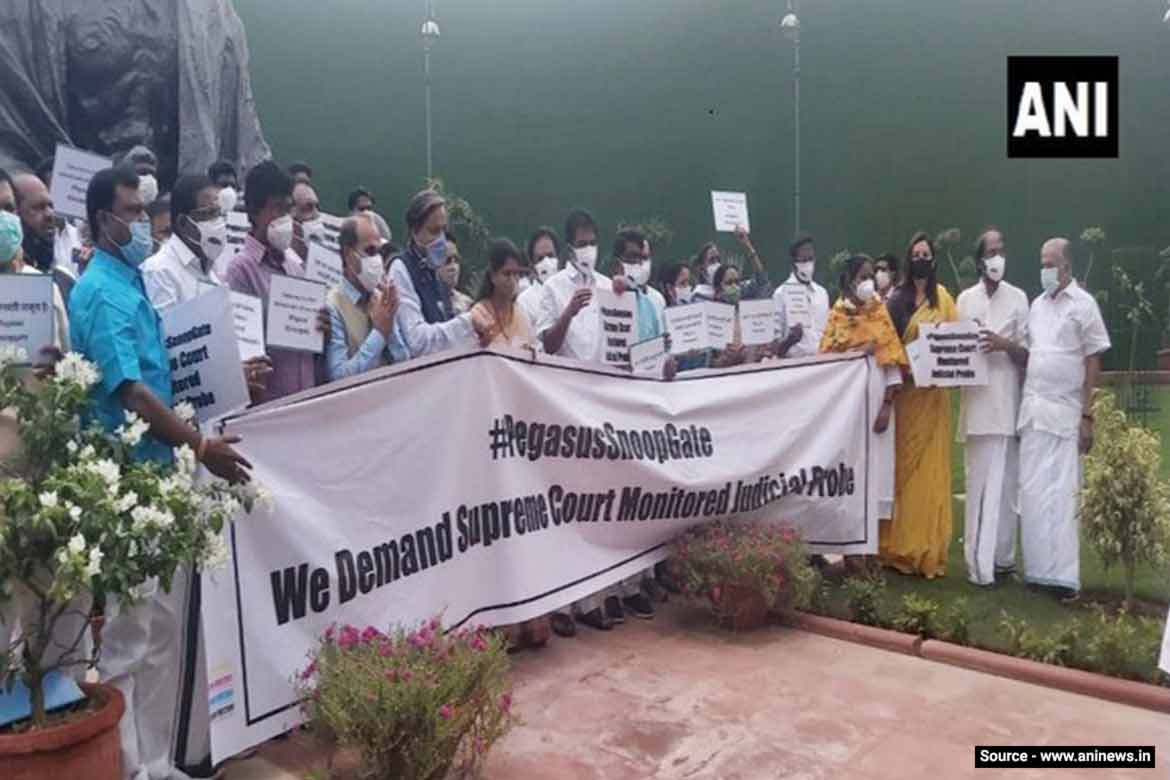For the past few days,the Indian Parliament has beenobserving a Hue and Cry over Pegasus Project. According to several reports, under the Pegasus Project, there are more than 300 Indian mobile telephone numbers that have been targeted using spyware produced by the Israeli company ‘NSO Group’. These targeted numbers were used by ministers, opposition leaders, journalists, the legal community, businessmen, government officials, scientists, rights activists and others.However, the government is outrightly denying any such claims.
In India, albeit the government can conduct covert surveillance within the ambit of existing laws that provide for impunity for such surveillance. However, several issues related to the monitoring system also exist.
Existing surveillance provisions in India:
For surveillance purposes, the Government of India resorts to the legal provisions provided under the Indian Telegraph Act,1885 and the Information Technology (IT) Act, 2000.Different sections of these legislations empower the government to exercise complete opacity with respect to its interception and surveillance activities.
The provisions under the Telegraph Act apply to telephone conversations and the provisions of the IT Act to all communications using computer resources. Section 69 of the IT Act and the Interception Rules of 2009 are even more opaque than the Telegraph Act and provide very little or no protection to those being monitored.
Notably, none of the provisions allows the government to hack any person’s phone, as the hacking of computer resources, including mobile phones and apps, is considered a criminal act under the IT Act.
However, surveillance in itself, whether carried out under the provision of the law or without, is a violation of the fundamental rights of citizens.
Ill-effects of intrusive surveillance:
The biggest threat from surveillance is curbing the freedom of the press. In the year 2019, similar allegations were made. As per the allegations, the journalists and human rights activists were targeted through the ‘Pegasus’ spyware.
In the World Press Freedom Index released by ‘Reporters Without Borders’, India has been ranked 142 in the list of 180 countries in the year 2021. Certainly, the press needs more protection and freedom. Confidentiality and free expression are what enable good reporting.

Also read: How Social Media Can Influence The Democracy?
Moreover, the mere existence of a surveillance system affects the right to privacy and the right to freedom of expression and personal liberty, respectively, provided under Articles 19 and 21 of the Constitution.Fear among citizens that their email is being read by the government, which may affect their ability to express, listen and discuss unconventional views. In the absence of privacy, the security of journalists, especially those journalists whose reports criticize the government, and the personal security of their sources/sources, are at risk.
Consequently, the surveillance system promotes the spread of authoritarianism in government functioning, as it allows the executive to exercise greater power over citizens and influence their personal lives.
Besides, it is against the due process of law. Surveillance carried out entirely under the control of the executive violates the very foundation of Articles 32 and 226 of the Constitution as it is carried out in secret.Thus, the affected person is unable to prove the infringement of his rights. Not only does it violate the ideals of due process and the concept of separation of powers, but also the concept of separation of powers.
A middle path:
There is a need for judicial oversight to satisfy the ideal of ‘due process of law’, to maintain an effective separation of powers and to meet the requirements of procedural safeguards and natural justice. Only the judiciary can be competent to decide whether specific instances of surveillance are proportionate or whether less miserable alternatives are available to the citizens. Judiciary itself can maintain the balance between the need for the objectives of the government and the protection of the rights of the affected persons.
There is a need for judicial oversight on surveillance systems in general and a judicial investigation into the Pegasus hacking, as the leaked database of targeted numbers also includes the phone number of a sitting Supreme Court judge that calls into question the independence of the judiciary in India.
Seeing the gravity of the situation, are form in the surveillance system of India is much needed.In fact,a comprehensive reformed surveillance framework has been long overdue.

Also read: How Ready Is India To Tackle Cyber Attacks On Critical Infra?
Not only are the existing security frameworks weak with respect to surveillance, but the proposed legislation relating to the protection of the personal data of Indian citizens has also failed to address the issue of surveillance even though it has provided wide exemptions for government officials.
Hence, there is a need for greater transparency in the system, because in the present system the government agencies do not hold any accountability to anyone other than the government. The current debate is not only about ‘whether or not to have a surveillance system’, but also about ‘how, when and what kind of surveillance’ is to be allowed.
If the protection of national security can be ensured by minimal violations of fundamental rights, the government is constitutionally obliged to adopt measures that involve minimal infringement or violation.
The reforms to be brought in the Indian surveillance system should incorporate the Ethics of Surveillance which considers the ethical aspects of the methods of monitoring planning.
In a nutshell:
It is also an apposite time to consider the matter as vigorous debates are raging around the world on the protection of fundamental rights against the use of surveillance mechanisms by an aggressive and intervening state in the name of national security.
